Compared to two decades ago, penetrating a crowded market today without a robust sales lead generation strategy is almost impossible.
Customers today have everything they need to get an all-rounded knowledge of any product/service they seek. Customers know what they want, who are the market’s best sellers, and what the average cost is.
Now, you may wonder: What if we run traditional ads online? That’ll surely give us a boost!
Actually, no.
“84% of millennials don’t trust traditional advertising.”
In my opinion, the only thing you should do is try to generate high-quality leads and try to convert them. In that journey, a customer relationship management (CRM) software solution will be paramount.
Just in case you’re starting out with CRM implementation for lead generation, here’s a quick video to get you up and running –
What Is a Sales Lead?
A sales lead is the first step in the journey from potential interest to actual customer. Think of it as a potential customer in the early stages of the buyer’s journey. They have identified a need or challenge that your product/service can address but haven’t yet made a purchase decision.
This sounds simple, but wait, there’s more to it.
Assume your daily website traffic is close to 1,000. But does that mean 1,000 visitors are going to become customers? No. That’s the same thing for sales leads.
Just generating hundreds of leads alone may not translate to sales. To convert these leads, you need to identify the high-quality ones (the ones that are more likely to purchase) and nurture them.
9 Best Lead Generation Strategies
Your lead generation process should primarily focus on filling the top-of-the-funnel (TOFU) stage with high-quality leads. The best marketing strategy for that in today’s digital age should be meeting customers where they are.
With that said, let’s move straight to the top 9 strategies for sales lead generation.
1. CRM Lead Generation
Using CRM software has long been one of the most popular ways for sales teams to generate and manage leads. It’s not just a tool for managing existing customers; it’s also crucial for tracking and nurturing leads.
So, who is such a software solution for? To answer that, you need to evaluate the pain points your sales/marketing team has. Start by asking questions like –
- Does your team struggle with internal collaboration?
- Do you need centralized access to contact data?
- Do you require better sales and email tracking?
- Are you having problems tracking client interactions?
- Have your conversion rate or customer retention levels taken a hit?
If you’ve encountered any of the following, you should invest in CRM software. And the benefits? Let’s check some of them below –
Centralized Lead Management
A CRM system lets you gather leads from multiple sources and track their progress through the sales funnel, providing a centralized location for all lead-related information. Any lead that fills your webform gets its information stored automatically in the CRM system.
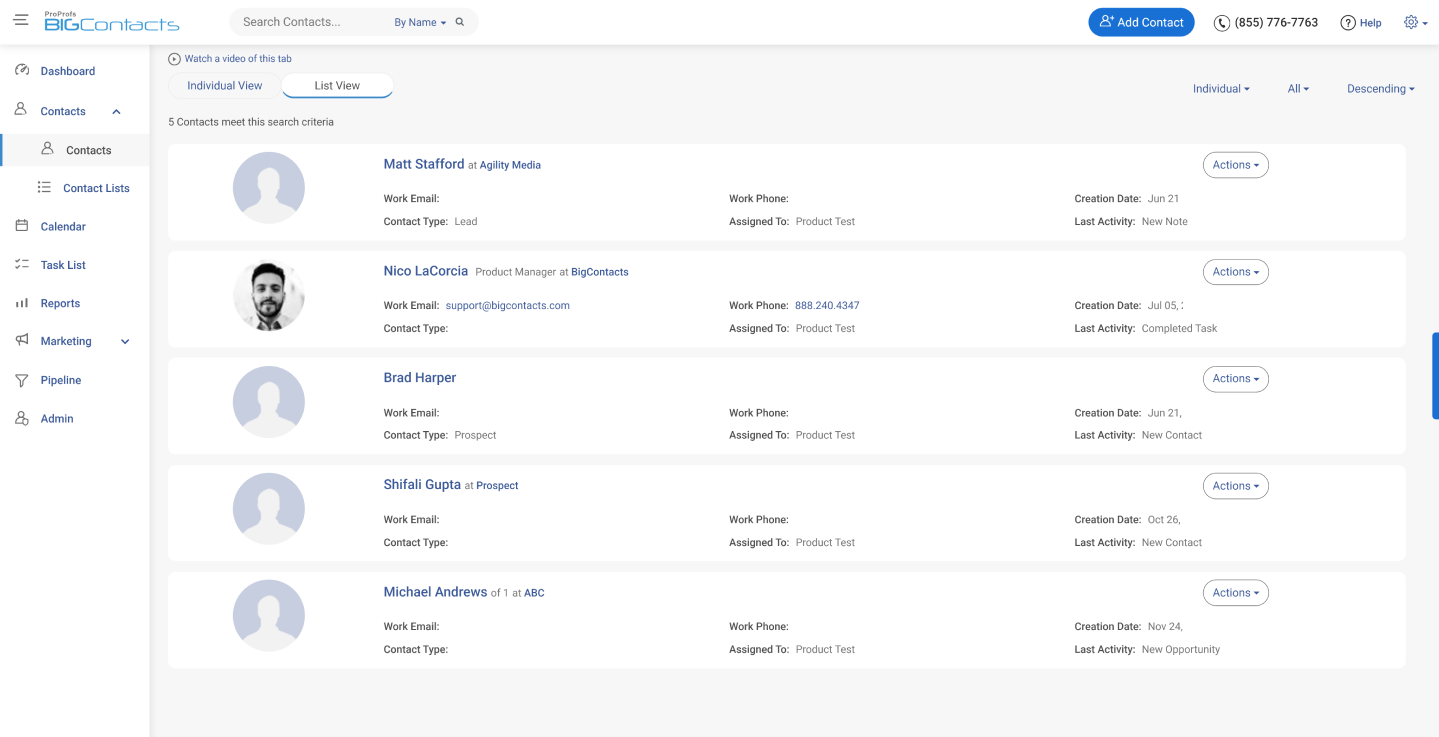
Automated Tasks & Reminders
You can automate tasks and reminders to ensure that no follow-up or lead nurturing opportunity is missed.
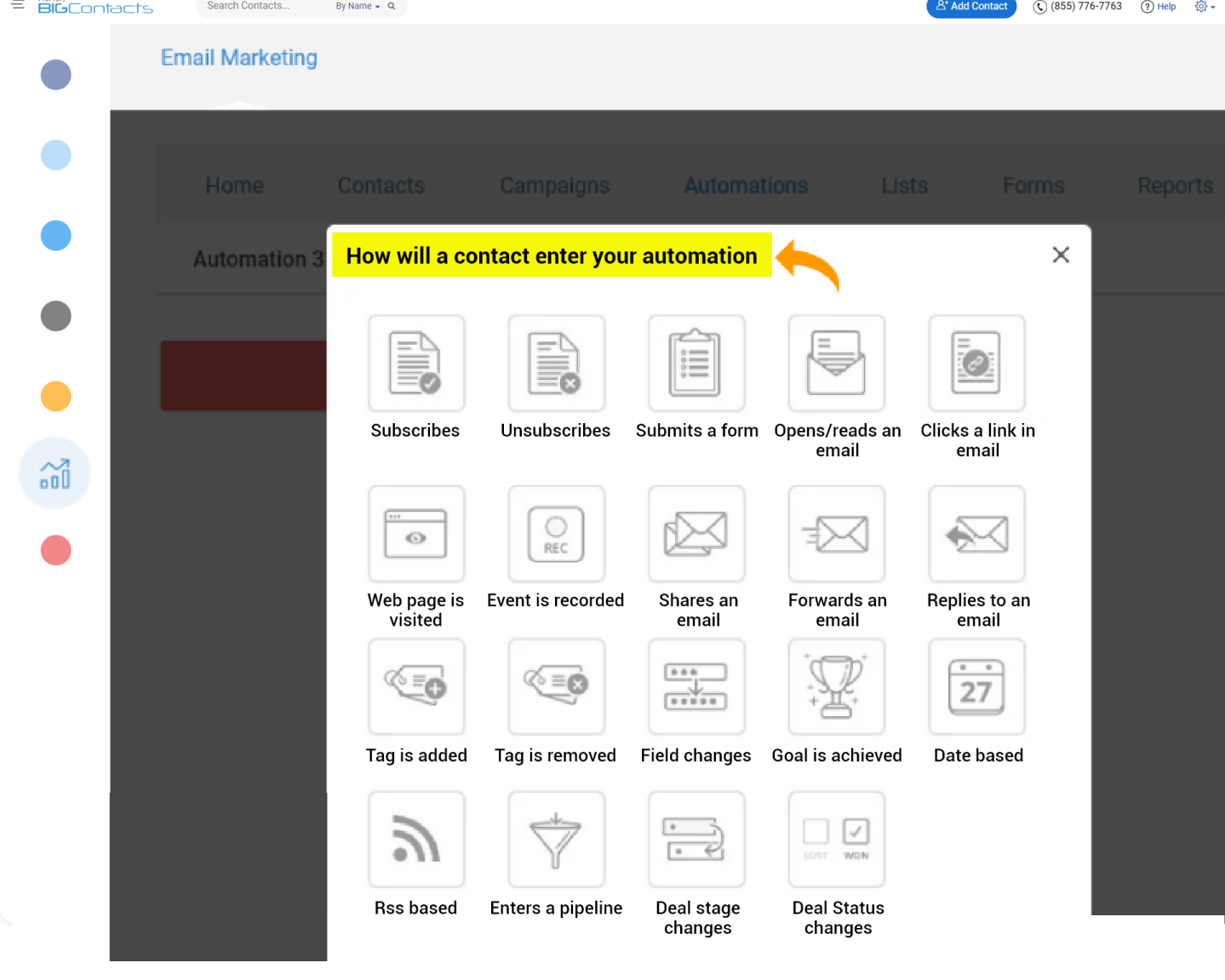
Custom Sales Pipelines
CRM software lets you build and manage custom sales pipelines to manage the entire sales process more effectively and move leads smoothly toward a sale. View the lead’s current stage, any previous touches, their preferred mode of communication, and other important information that can help you process leads.
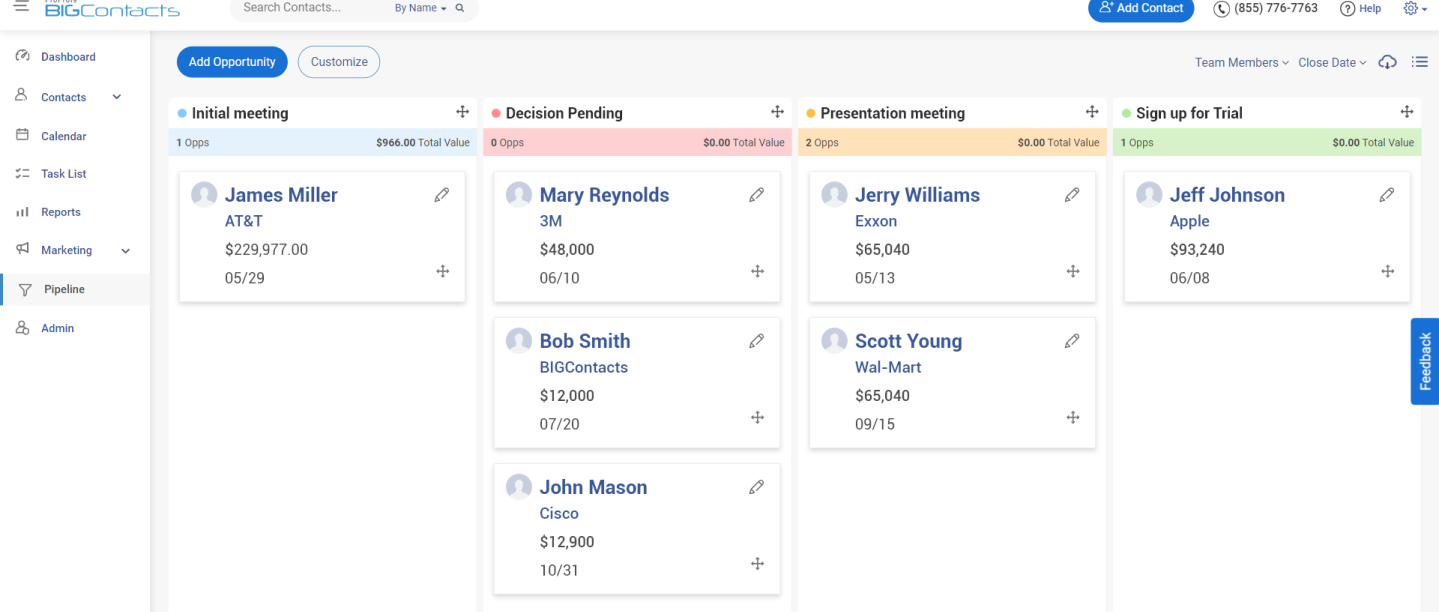
Reporting & Analytics
A CRM tool allows you to measure the results of interactions with its reporting and analytics capabilities. With the help of reports, you can easily identify which lead generation channels are bringing the most promising leads. That way, you can reduce the marketing expenses of covering all channels, focusing only on the ones bringing the best results.
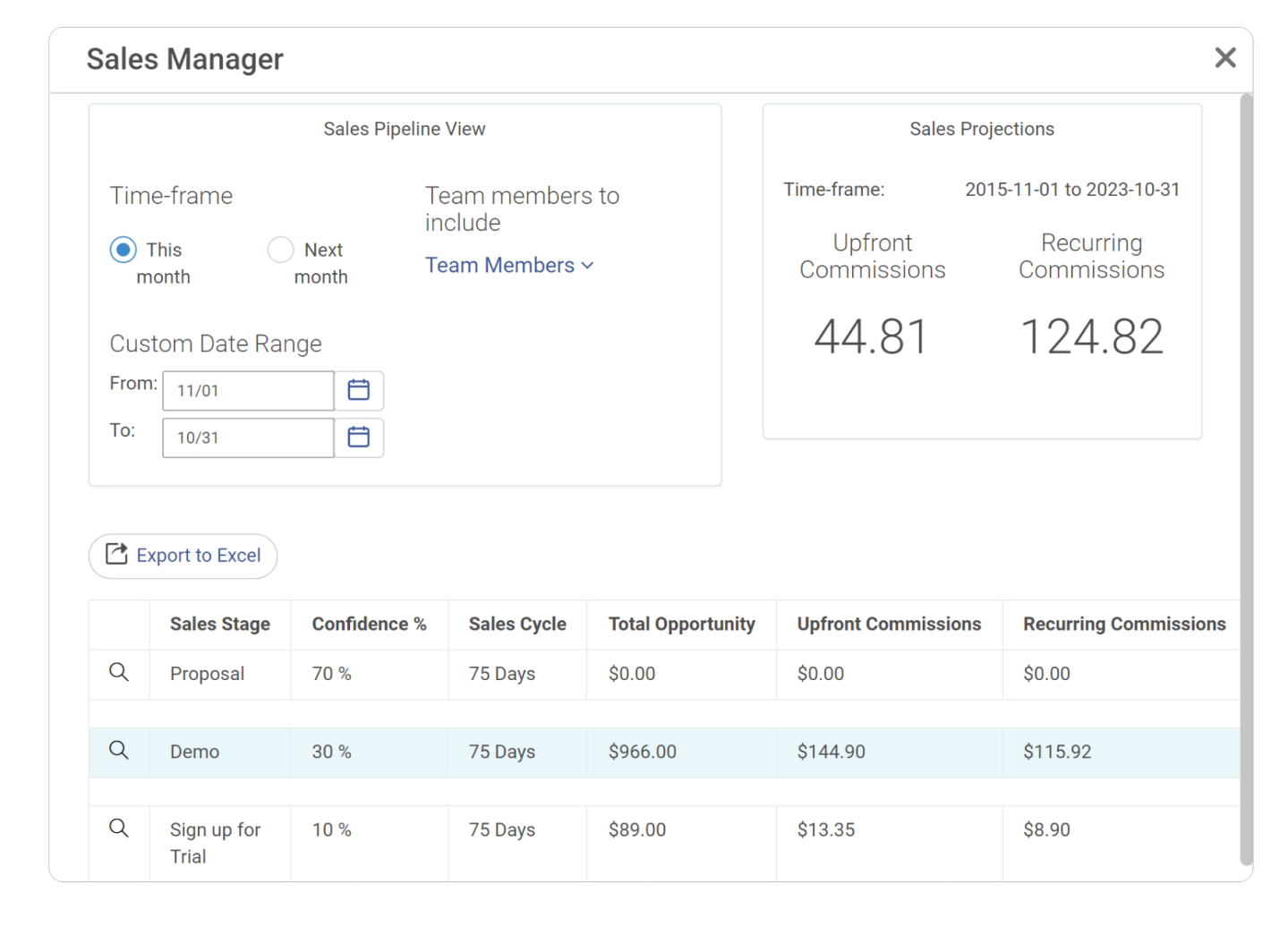
Enhanced Lead Qualification
It helps define and distinguish between different types of leads (IQL, MQL, SQL), ensuring that your team focuses on high-quality leads likely to convert.
Read More: Lead Qualification: A Step-by-Step Guide Process, Definition
2. Email Marketing
In 2024, email marketing revenue is estimated to reach $12.33 billion.
Using a capable email marketing tool, you can create personalized email campaigns that offer value and speak directly to your audience’s needs. Not just that, it can also help you nurture leads through the sales funnel, from awareness to decision.

Here’s a step-by-step guide to getting started with email marketing –
- Build an email list of qualified leads through various methods (such as offering valuable content downloads) in exchange for email addresses.
- Segment the email list based on interests and demographics to send personalized emails.
- Nurture your leads with targeted drip campaigns that provide a mix of valuable content, special promotions, etc.
- Automate sales email campaigns to follow up with prospects at the right time based on triggers and actions.
- You can also track emails or save time with pre-designed email templates.
Read More: List of Top 9 CRMs for Email Marketing in 2025
3. Leverage Social Media Platforms
Did you know that an average person uses 6.7 different social media networks per month?
It’s time to change perceptions about social media.
Social media is not just for socializing; it’s a goldmine for leads. By engaging your audience through regular posts, interactive stories, and targeted ads, you can create a community around your brand and drive interest.
And the best thing? A majority of this venture is absolutely free.
Platforms like LinkedIn and Twitter are great for connecting with potential customers. Share engaging content, participate in relevant industry conversations, promptly respond to comments and messages, and actively engage with potential leads.
🔥 Interesting Fact: A recent study by Yotpo suggests that social media reviews boost social commerce. For example, average conversion rates found on Twitter are a whopping 6.46%.
Image source: Yotpo
4. Content Marketing
Around 81% of marketers acknowledge content as one of the core marketing strategies.
Quality content can attract leads like a magnet. But what does the term ‘quality content’ refer to?
Well, it is about crafting valuable content that addresses the needs/questions of your target audience. You need to put a fine line between – sharing knowledge through content and establishing your brand as a trusted authority in the field.
From informative blog posts and infographics to engaging videos, the goal is to provide content that resonates with your audience, encouraging them to engage further with your brand.
And to answer the ‘why’ behind all this, you can refer to the statistics presented at the start of the blog.
5. Search Engine Optimization (SEO)
When potential customers search online, you want to be found. Being on the first page of Google is like having the best billboard in town.
So, if visibility is currency, SEO is your bank vault.
Optimizing your website for search engines is a critical component of both B2C and B2B lead generation.
So, understanding the fundamentals of SEO is crucial. Here are some SEO tips for lead generation to help you get started-
- Thorough keyword research: Identify terms with high search volume and low competition. Focus on keywords that indicate buying intent, such as terms including phrases like “buy,” “best,” “reviews,” or comparisons. By targeting these keywords, you attract leads who are most likely to convert into paying customers.
- Integrate keywords naturally: This practice, known as on-page SEO, helps search engines understand your content’s relevance. Integrating the keywords naturally into the website content (page titles, meta descriptions, headers, and body copy) increases organic traffic – attracting leads who are actively searching for solutions like yours.
- Update website regularly: Regularly updating your website with fresh, keyword-rich content boosts your SEO rankings. Conduct an SEO content audit to evaluate the quality and performance of your content and identify pages that need improvements. This not only improves SEO but also nurtures leads by providing them with informative content that strengthens your credibility.
- Mobile-friendly interface: Mobile-friendliness ensures swift loading times and offers an intuitive user experience. This translates to higher lead generation, as users can easily find the information they need and take the desired action, whether it’s subscribing to your newsletter, requesting a demo, or making a purchase.
6. Webinars & Online Workshops
Offering free webinars or workshops on topics relevant to your target audience is a great way to generate leads. It positions your business as a thought leader and offers a unique opportunity to interact directly with potential customers, answer their questions, etc.
The first thing you’d need is a reliable webinar software.
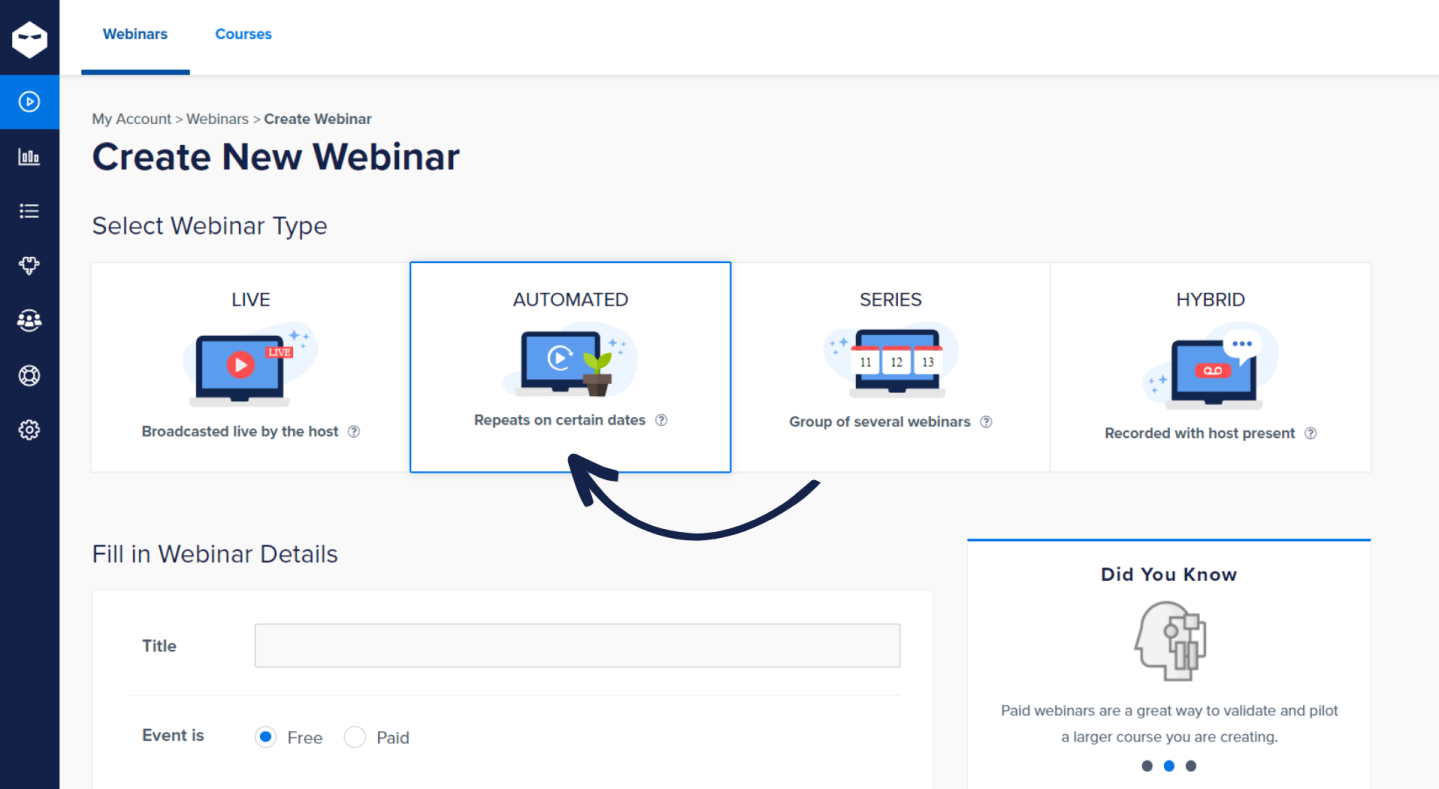
Image source: WebinarNinja
Next, here are some tips that can help you get started with your target audience –
- You can host webinars/online workshops to educate potential customers about your solutions.
- Offer valuable, informative webinars that address your target audience’s pain points and challenges.
- Promote your webinars through social media, email marketing, and website.
- Ensure that the registration process is seamless and not lengthy.
- Provide clear calls to action at the end of your webinars to convert them into leads.
If these work for you, consider co-hosting webinars with other firms (not competitors) to reach a broader audience and expand your lead generation potential.
7. Referral Programs
Word-of-mouth is a powerful lead generator, especially for small businesses.
Nearly 82% of Americans have claimed that they consider family or friends’ recommendations before making a purchase.
So, referral programs are a powerful tool to leverage an existing customer base and tap into the trust they hold for the brand. Satisfied customers are more likely to recommend your product or service to their network, bringing in high-quality leads who are already pre-sold on the value you offer.
Here’s an example of a referral program brought to you by Google –
Case in Point: Google Workspace Referral Program
In 2014, Google launched its referral program under Google Workspace (previously, G Suite).
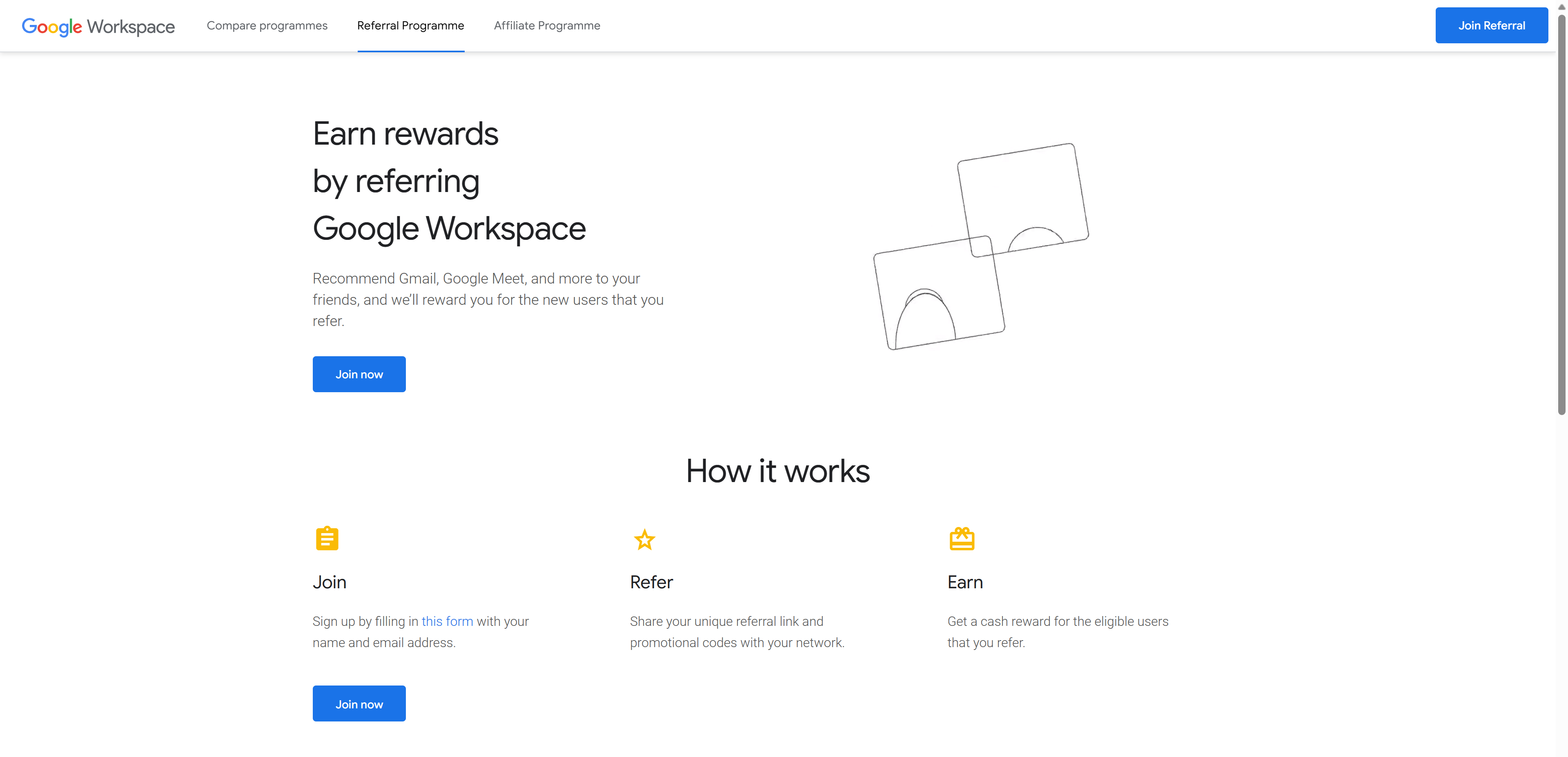
Image source: Google
It is a striking example of a customer and client acquisition referral program because of how it is designed to target both individual users and businesses alike.
Rewards for Referrers:
Upon each successful referral, you (the referrer) receive a direct deposit of up to USD 23 (may vary based on the plan purchased by the referee and their country).

Image source: Google
The Outcome:
In October 2020, Google announced that Workspace had more than 2.6 billion people using it every month. That’s up from 2 billion in March of the same year. Also, by April 2020, they had over 6 million businesses using Workspace and another 120 million users in G Suite for Education.
Key Takeaways: Why did it work so well for Google?
The referral program helped Google skyrocket conversions – thanks to their tiered rewards that keep multiplying with the total number of users referred by the referrer. But that wasn’t the only reason.
I’ve found and listed some more down here –
- Google has made it easy for people to understand how their referral program works.
- They have clear instructions and guidelines on their referral webpage.
- They also keep referrers updated regularly with emails about their referrals (encourages them to chase high-quality referrals and nurture them)
The emails provide useful information like –
- How many people are currently trying out the product
- How many have finished the trial but haven’t become paying customers yet
- How many have become paying customers after 90 days
- For those who want more details, you can contact Google directly to find out how many users each referral has.
Now that you know the power of a referral program in generating leads and even boosting conversions, I’m sure you’d appreciate some practical tips for referral program to craft your own. Keep reading!
- Clearly define the program: Outline the program’s benefits for both your existing customers (referrers) and potential customers (referrals).
- Offer attractive incentives: These could be discounts, free products, loyalty points, or even cash rewards.
- Make participation easy: Don’t bury your referral program deep within your website. Make it readily accessible, with clear instructions on how to refer someone.
- Seamless referral process: Consider integrating the program with a CRM platform or marketing automation software to automate tracking and reward fulfillment.
- Promote the program actively: Don’t expect customers to discover your referral program magically. Promote it through your website, email marketing, social media channels, and even point-of-sale materials.
8. Pay-per-Click (PPC) Advertising
In sales lead generation, PPC campaigns have a big role. These allow you to place targeted ads on search engines and social media platforms, reaching a highly qualified audience actively searching for solutions like yours.
The key to successful PPC advertising lies in targeting: carefully select keywords, demographics, and interests to ensure your ads are seen by those most likely to convert.
For example, if you search “web hosting services in California”, you’ll find ads that are most relevant before you reach the SERP results.
Here’s how to leverage PPC advertising for lead generation –
- Identify keywords with high search volume and low competition that your target audience is actively using.
- Using tools like Google Keyword Planner and social media platform insights can be invaluable in this process.
- Write clear, concise, and benefit-oriented ad copy that highlights the value proposition of your offering and compels users to click.
- Utilize demographics, interests, behaviors, and location targeting to ensure your ads reach the most relevant audience possible.
- Create dedicated landing pages that align perfectly with your PPC ad copy. These landing pages should be optimized for conversions with a clear call to action.
🔥 Pro Tip: Consider utilizing retargeting campaigns. This allows you to show ads to users who have previously interacted with your website or social media profiles. It’s highly effective for re-engaging website visitors who may not have converted on their initial visit.
9. Customer Feedback & Surveys
Did you know that engaging your existing customer base with surveys and feedback requests is a great way to generate leads?
It not only provides valuable insights for improving your offerings but can also uncover potential leads among those who show a heightened interest in your products or services. Use a user feedback tool that offers templates, multiple survey types, and detailed analytics.
To uncover this gold mine for generating leads, you need to –
- Gather feedback throughout the customer journey by integrating feedback mechanisms, such as post-interaction surveys or website feedback forms.
- Focus on open-ended questions that encourage detailed responses, along with multiple-choice options for gathering quantitative data.
- Offer incentives like discounts or entries into prize draws to encourage customers to complete your surveys.
- Analyze survey responses to identify trends, customer pain points, and areas for improvement.
The best part of conducting feedback and surveys is that you can use positive customer testimonials and survey results as social proof on your website and marketing materials. This builds trust and credibility, attracting potential customers who see the value you deliver.
Importance of Sales Lead Generation
Having read the best strategies to implement lead generation in sales, you’d probably like to have a quick go at the benefits or the importance of the process. I’ve got you covered.
Builds a Foundation for Sales
Lead generation is the foundation upon which the sales process is built. Without a steady stream of leads, sales teams lack the necessary prospects to reach out to, making it difficult to meet sales targets and generate revenue.
Promotes Business Growth & Expansion
For small businesses, growth is often synonymous with effective lead generation. By consistently bringing in new leads, you can expand your customer base, enter new markets, and increase market share.
Tap Into Customer Insights
Generating leads also provides valuable insights into customer preferences and behaviors. This information is vital for tailoring marketing strategies, developing new products, and improving services to meet the target audience’s needs better.
Gain a Competitive Edge
In a competitive landscape, businesses that excel at lead generation have a distinct advantage. They are able to capture the attention of potential customers before their competitors, positioning themselves as the preferred market choice.
Better Efficiency & Resource Allocation
Effective lead generation allows you to allocate resources more efficiently. By managing high-quality sales leads, you can optimize sales efforts, reducing the time and money spent on pursuing less promising prospects.
Improves Brand Awareness & Reputation
Lead generation activities often contribute to increased brand awareness and a stronger brand reputation. As potential customers engage with your content and marketing efforts, they become more familiar with the brand, which can lead to word-of-mouth referrals and organic growth.
Long-Term Customer Relationships
“Do what you do so well that they will want to see it again and bring their friends.” – Walt Disney
Finally, lead generation is not just about acquiring new customers; it’s about starting a journey towards long-term relationships. By nurturing leads effectively, your business can convert one-time buyers into loyal customers who provide recurring revenue and become brand advocates.
Common Lead Generation Mistakes to Avoid
Something that I have learned is that you learn faster from your mistakes than you do by reading the guidebook. As someone who has worked with several sales and marketing teams over the last few years, I made a list of the most common mistakes small businesses or startups usually make.
Read these carefully to help your business stay on track –
- Casting a Wide Net: The urge to attract everyone might seem tempting, but it’s a recipe for wasted time and resources. You should focus on generating leads that align with your ideal customer profile (ICP).
- Inconsistent Lead Nurturing: Don’t leave your leads hanging after the initial interaction. Develop a nurturing strategy that provides valuable content, addresses their pain points, and gradually moves them closer to a purchase decision.
- Neglecting Mobile Optimization: Ensuring your website and lead capture forms are optimized for mobile devices is crucial. A clunky mobile experience can deter potential leads and derail managed lead generation efforts.
- Ignoring Analytics: Track key metrics like website traffic, conversion rates, and lead sources. Analyze this data to identify what’s working and what’s not. Use these insights to continuously refine strategies and maximize return on investment (ROI).
- Failing to Follow Up: Prompt follow-up is essential for converting leads into paying customers. Respond to inquiries promptly, address their concerns, and guide them through the sales process.
- Not Personalizing Your Approach: The one-size-fits-all marketing approach doesn’t work today. Segment your audience based on interests and demographics, and tailor your messaging and communication accordingly.
- Forgetting about Content Quality: Don’t settle for mediocre blog posts or generic infographics. Invest in creating high-quality, informative content that establishes you as a thought leader in your industry.
- Neglecting Social Proof: Not showcasing social proof through customer testimonials, case studies, and positive reviews is a big mistake, as you’re missing out on leveraging the power of social influence.
Skyrocket Sales Lead Generation With BIGContacts
To find high-quality leads that transform into profitable customers, you must choose a powerful lead-generation platform – preferably a CRM software solution.
The software you choose should be able to help you generate and manage business leads in an uncomplicated and effective way. It should not overwhelm your sales and marketing teams or make you go bankrupt while using it for the long run.
That is where a tool like BIGContacts comes into the picture.
It’s not any extraordinary CRM software with hundreds of features you won’t ever need in day-to-day usage, but one that will ease your lead generation and contact management process. Like me, if you’re also tired of clunky UIs and want a CRM platform that offers effortless pipeline management, contact management software and email marketing, then this tool is for you.
Test the software today to see if it’s the right fit for your team!
Frequently Asked Question
What are the stages of a lead generation funnel?
The lead generation funnel (or the marketing funnel) has three parts in total -
- Top of Funnel (TOFU): It consists of fresh leads seeking solutions, yet they might not be prepared for purchase.
- Middle of Funnel (MOFU): This one is filled with prospective customers displaying notable interest in your brand's products.
- Bottom of Funnel (BOFU): It contains the least number of leads, but these are the ones primed for business transactions.
What are the different types of sales leads?
Sales leads can be categorized in a few different ways -
By Qualification:
- Marketing Qualified Lead (MQL): A lead who has shown some interest but may need further nurturing by marketing before being sales-ready.
- Sales Qualified Lead (SQL): A lead who is a good fit for your product/service and is ready to be contacted by sales.
By Source:
- Inbound Lead: A lead who finds you organically through your website, content, or social media.
- Outbound Lead: A lead generated through your outreach efforts, like cold calls or emails.
By Industry:
- Marketing Lead: A lead interested in marketing-related products or services.
- Sales Lead: A lead interested in sales-related products or services.
What are the sales lead generation stages?
The sales lead generation stages can be understood using the AIDA model -
- Awareness: This is where potential customers first learn about your brand and what you offer. This could be through marketing campaigns, social media presence, or organic search results.
- Interest: Once aware, some prospects will show further interest by engaging with your content, downloading resources, or visiting your website for more information.
- Decision: At this stage, interested prospects are actively considering solutions to their problems. They might compare your offerings with competitors and weigh their options.
- Action: This is the final stage, where prospects convert into paying customers by making a purchase or signing up for your service.
How do I improve lead generation with CRM software?
A CRM system like BIGContacts acts as your lead generation command center, boosting your efforts in these key ways -
- Centralized Lead Organization: CRM keeps all your leads in one place, organized, and easily accessible.
- Interaction Tracking: Track every touchpoint with a lead – calls, emails, website visits – building a complete customer journey picture.
- Automated Nurturing: CRM automates email campaigns, sending targeted content and reminders to keep leads engaged throughout the sales funnel.
How do I qualify a sales lead?
Qualifying a sales lead involves filtering prospects to see if they're a good fit for your offering. Consider these three key factors -
- Budget: Do they have the financial resources to afford your product or service?
- Needs: Do their challenges align with the solutions you provide?
- Decision-Making Power: Do they have the authority to make a purchase decision?
How do I improve lead quality?
To improve lead quality, you need to focus on three key areas -
- Targeting: Refine your targeting to attract prospects who closely resemble your ideal customer profile.
- Personalization: Tailor your communication and content to resonate with individual lead needs and interests.
- Content Value: Offer high-quality content that educates, addresses pain points, and positions you as a trusted advisor, attracting ideal customers.
What is the difference between B2B and B2C lead generation?
The key difference between B2B and B2C lead generation lies in the target audience.
B2B (Business-to-Business):
- Targets other companies, often involving a longer sales cycle with multiple decision-makers.
- Focuses on building trust and establishing your brand as a reliable solution provider.
B2C (Business-to-Consumer):
- Targets individual consumers, typically with shorter sales cycles and a single decision-maker.
- Emphasizes creating desire and urgency to convert prospects into customers.
What is a lead generation tool?
A lead generation tool is a software application that helps you automate and simplify the process of attracting, capturing, and nurturing potential customers (leads). These tools can include features for -
- Creating landing pages and forms to capture lead information
- Managing email marketing campaigns
- Tracking website visitor behavior
- Automating lead nurturing sequences
- Qualifying leads based on set criteria
By using lead generation tools, you can improve lead generation effectiveness.
FREE. All Features. FOREVER!
Try our Forever FREE account with all premium features!








